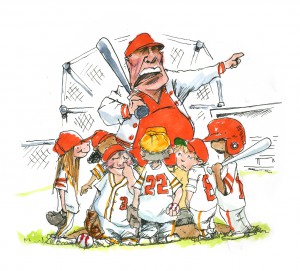 Coaches are people, too
Coaches are people, too
First off, we have to remember that a coach is a human being. As much as some of them don’t seem like it, they are, and all humans should be treated with respect. Many coaches are just dads, moms, or other people who have no formal training, but have some knowledge of the game and want to put it toward helping kids to grow in their game. Others are those who have a lot of knowledge, have coached for years, and some have formal training in coaching. Yet, others are egomaniacs and are doing it for the personal attention. Either way, the coaches are giving their time to make your kid a better ball player so that should be acknowledged.
Yelling and berating
Having said that, there are some situations when I think it’s appropriate to talk to your child’s coach. One of them is excessive yelling or berating. Youth sports are not the military, and I don’t feel like kids should be treated like they’re in basic training all the time. Also, it’s just a game and the kids should be having fun. If your child is on a travel team, obviously the games are more competitive and coaches get more serious, but if your kid’s coach is yelling at him or her all the time, that should be addressed.
kids should be having fun. If your child is on a travel team, obviously the games are more competitive and coaches get more serious, but if your kid’s coach is yelling at him or her all the time, that should be addressed.
Many coaches feel like they’re preparing kids for the “real world” by being tough on them. Although, most of us would not work for a boss who constantly yells at us, so I’m not sure how realistic that is. There may be some benefit to this toughness, but from my experience, my kids have thrived on teams where the coach was a motivational type of person rather than a harsh one.
Playing time
Playing time is a touchy issue. Coaches have many reasons for playing the players they put in, whether it be that he or she thinks that your child doesn’t have the necessary skills, or maybe your child is being disruptive or disrespectful. And then there’s the dreaded “Daddy ball” that so many coaches are guilty of where they play their own kids over yours regardless of their kids’ skills.
 If your child is very skilled and is not getting the playing time you feel he or she deserves, it may be time for a gentle conversation with the coach. Be realistic though. Some parents can be completely delusional about their babies, when in reality the kids should maybe not even be playing baseball or softball, or still have a lot to learn, so make sure you have a good sense of your child’s skills. A coach may just not feel that your kid is ready for a certain position, so working with them on your own to improve their skills is a great benefit. Make sure you have a very realistic vision of what’s going on.
If your child is very skilled and is not getting the playing time you feel he or she deserves, it may be time for a gentle conversation with the coach. Be realistic though. Some parents can be completely delusional about their babies, when in reality the kids should maybe not even be playing baseball or softball, or still have a lot to learn, so make sure you have a good sense of your child’s skills. A coach may just not feel that your kid is ready for a certain position, so working with them on your own to improve their skills is a great benefit. Make sure you have a very realistic vision of what’s going on.
If your child is in high school, it’s time for you to stop the helicopter parenting with sports and let him or her make their own way on the team. At this point, your child has learned how to talk to superiors and it’s a good time to let them deal with adversity. They already have a lot of practice with talking to teachers, so this should be more great experience in being diplomatic and handling their own business. And no high school coach likes a hovering parent. This is just my opinion though, and I’m sure many parents still get involved at the high school level.
 “This coach does not know the game”
“This coach does not know the game”
If you are dealing with a coach who doesn’t know what he or she is doing, I really think there’s no point in having a conversation because you aren’t going to fix it. In my opinion, you should just get through the season and tell your kid to do her best or get her on another team, and then explain to her that sometimes adults are not perfect. This does occasionally happen, where a person who has no business coaching does so. My kids have had a couple of coaches who gave cringe-worthy advice that I knew was wrong, but there was no point in telling them. One example is the “elbow up” theory which has been thoroughly debunked over years through research, video, and studies, but you still will occasionally hear a coach throwing that out there. If you are really worried about a coach telling your kid the wrong thing, what you could do is pull the coach aside and tell her that your child is training with a batting or pitching coach and you don’t want to confuse them. That should stop the advice.
How to talk to the coach
Whatever you do, make sure you talk to your child’s coach in private. Do not bring up the subject of yelling or playing time in front of other parents, your kids, or the team. Since coaches are human, they have a myriad of personalities and some people are naturally defensive. Talking in private may not calm this defensiveness, but at least you will not be embarrassing them or confronting them in front of others.
Make sure you are not angry. This should be a calm conversation. The last thing you want to do is alienate yourself from the coach which could make it harder for your child on the team. Since this person is coaching the team, most likely he or she enjoys helping the kids and will welcome any input or advice from parents. Of course, you could be dealing with the know-it-all coach and there may be no way to get through to him. Be your most diplomatic self and remember that you get more flies with honey than with vinegar.
I welcome any thoughts or suggestions you may have on this topic, so please feel free to add comments below.


When it comes to coaches, you should be very strategic on how to handle them. Especially the know it alls, these are the toughest to handle.
I totally agree, to approach the coach in private, but also, the method of delivery is important. Don’t shout or reprimand him/her, as this would backfire, and would also lead to possible victimization.
Hi Njogah. Thanks for your input. People are people and some are defensive. I also think that coaches feel they put a lot of work into their coaching and they want to be appreciated and not criticized. This can lead to some sensitivity. 🙂
That’s very good advice on how to talk to a coach. In fact that’s how we should talk to anyone with criticism right? Do it in private, keep calm (hardest part), be respectful/diplomatic. My boss at my last job was very much an egomaniac. Everyone in the office hated him and it was becoming quite a hostile place. One day I went into his office and spoke to him one-on-one. I politely and calmly told him that #1 he was a good boss (make him feel important) and I was learning a lot from him (which I was learning NOT to be like him). Then I explained how I get motivated, how I learn, and what I need to do my job to the best of my ability. I explained that when I feel that the people around me actually care and want me to succeed it makes me want to work harder and help them more. Anyways, I think he go the idea. It didn’t stop him from being a jerk but it did make him less of one and it made the energy in the office a lot better. We just need to talk to them and connect, not trash talk behind their back. Nothing gets solved with negativity in the long run.
I totally agree. Being respectful and giving a quick complement first is a great idea. 🙂
When it’s clear the coach doesn’t know the game, maybe step up to help when you can too, some coaches are quite open to other people’s ideas and knowledge, and probably would be thankful for the help, and to learn from you.
Yes, great thing to add. There are some coaches who are just starting out and would love help from knowledgeable parents. 🙂
Do you talk to the coach if there is a problem with other kids talking trash about your kid? Other kids in the team are telling kids at school that he shouldn’t be on the team. He tried out and the coaches chose him. He doesn’t feel part of the team he sits alone at the end of the dugout. It’s heartbreaking to watch. Am I being overly sensitive because it’s my kid?